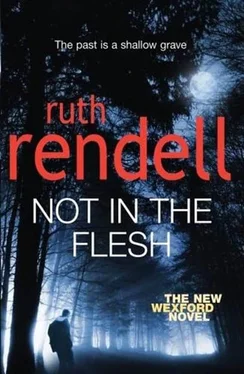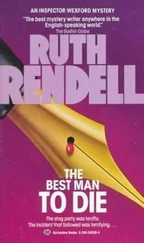“That's it! I drove the wife to Morella's shop. She never fancies fruit from them supermarkets. It was a Saturday, must have been. I never go to the shops on weekdays. And you're right about eight years ago. That's when it was. We had our girl with us and she was fifteen then. Funny I remember that, but I do because of her being fussy about her food, like they are when they're in their teens, and going on an apple diet. That's all she'd eat, apples and that stuff they call muesli.
“Them fruit-pickers was on the field. This chap was driving the truck what fetched the boxes off the field and brought them to the shop. He come in carrying a box of apples and he was wearing that T-shirt. My daughter said, ‘Look at what he's wearing, Dad. Look at that picture, that's a scorpion. I wouldn't wear a thing like that,’ she said. ‘It's gross.’ Young chap-well, he was then. My daughter'd seen a program on the telly about scorpions, she'd seen the name.”
“You're a marvel, Mr. Runge,” said Damon. “You've missed your vocation. You ought to be in the force.”
He was almost satisfied. But should they have confirmation? In the shop Runge had just come from, Damon bought cod and chips and a pickled gherkin and ate them in the car. Maybe he should try asking at shops in Flagford where just two remained of the ten that had once been there. At the grocer's that called itself a supermarket and incorporated the post office, he showed the photograph to the man dispensing stamps and the woman at the checkout, but although both of them had been in the same jobs eight years before, no one recognized the scorpion T-shirt. The other shop was one of those where passersby always speculate as to how it can possibly make any sort of living. It sold or tried to sell maternity wear and baby clothes. A very old woman behind the counter smiled hopefully at him but seemed incapable of understanding what he asked her. Repeatedly she said her shop stocked nothing like the garment in his photograph and never had. It was ugly, she said, it wouldn't appeal to customers.
He gave up and turned his attention to the last people on his list, the Tredowns. They were the nearest to Grimble's Field. It would be visible from every upstairs window in Athelstan House on the western side. As he drove back to Flagford, he thought about what Bill Runge had seen and what it meant. The man in the cellar had worn that T-shirt, and therefore it was almost certain that the man in the cellar had been an itinerant farmworker seen in Flagford just a little before that. Only almost? A second sighting was essential. He drove up to Owen Tredown's house and parked outside the front door.
Burden and Lyn Fancourt were in the bungalow called Sunny-bank. They had gone into the bedroom and were contemplating the inside of the wardrobe. Lyn took down one garment after another and laid them on the bed. When she came to the sports jacket, brown tweed with leather patches on the elbows, Burden stopped her. He put a glove on his right hand and, feeling in the pockets, brought out a watch, white metal with a worn leather strap, an equally worn wallet, and two keys on a ring.
“So that's why those McNeils found nothing when they searched his clothes,” said Burden.
“Only a thousand pounds, sir.”
“Yes, in the pocket of his jeans. It looks as if he'd just received it and stuffed it in his jeans pocket. Maybe he thought it was safer there, close to his body, than in the pockets of that anorak, which is where he must have carried the wallet and the keys.”
“But why put all that stuff in someone else's jacket?”
“He planned to wash himself, didn't he? That's why he took off his watch. This is what I think happened. He stripped down to his underclothes, left his jeans with the thousand pounds-did he temporarily forget it was there?-his anorak, the T-shirt, and his sneakers on the kitchen counter. Then he took his wallet-where perhaps he thought he'd put the money-and his keys into the bedroom, opened the wardrobe, and found the only garment he fancied wearing, the sports jacket, though I suspect everything in here was in better nick than what he'd had on. Maybe he'd have taken a raincoat as well. He took off his watch, put it with the wallet and the keys into one of the sports jacket's pockets in preparation for putting it on after he'd had his wash. Probably he meant to put the T-shirt back on and no doubt the jeans with the money in. Old Grimble's trousers would have been too short for him. Before he could do that along comes the gallant McNeil and shoots him.”
“No knife, sir.”
“No knife,” Burden repeated.
Admitted to the house by Owen Tredown himself, Damon thought he had never seen anyone look as ill as this man did and still be on his feet. He was a wraith, a depleted creature with half his substance gone, skeletally thin, his ribs outlined through the thin shirt he wore and his face the color of old yellowed paper. A bird's-claw hand was put into Damon's.
“I am a sight, aren't I?” Tredown said to this man he had never met before. “If you met me on a dark night you'd run like hell.”
Damon nodded, tried to smile. “You don't seem very well, sir.” Could there be a greater understatement? “Shouldn't you be sitting down?”
“I will in a minute. I don't want to give up before I have to.” They went into a large shabby room where the long brown velvet window curtains had been flung back wildly as if by a frenzied hand. “I've had to stop writing,” Tredown said. “It's the worst thing. If I can't write I might as well be dead.”
Damon didn't know what to say. A voice coming from behind the high back of a sofa made him jump. “How you do exaggerate, Owen,” it said, and a long-fingered beringed hand appeared from where the voice had come from and gave a fluttering wave.
Tredown had seated himself in an armchair and motioned Damon to another before the owner of the voice appeared, a tall woman with a girl's long dark hair and an old woman's lined face. She looked him up and down. “Hallo. We haven't met. I'm Claudia Ricardo. Do you find it difficult being black in a place like this?”
“Don't, Claudia,” said Tredown mildly.
Damon didn't answer her. He wasn't going to answer her, he thought, even if it cost him his job. He was taking the photograph of the T-shirt out of his briefcase when a small, round woman in a gray wool dress came into the room. She stopped when she saw the photograph-because she recognized it?
“What a ghastly thing,” she said in a contemptuous tone.
The other woman, barely suppressing giggles, said, “This is my wife-in-law, Maeve. The present Mrs. Tredown,” as if there might be some possibility of the fragile wreck in the other arm-chair remarrying. She said to Maeve, “He's a policeman, though you wouldn't think it to look at him, would you?”
“Have any of you seen this garment before?” He was losing the will to be polite.
“What is it?” This was Claudia Ricardo. “Would anyone in their right mind actually wear a thing like that?”
“Someone with no taste might,” said Maeve Tredown.
Damon thought this a bit rich, coming as it did from a woman responsible for furnishing this bleak room in the browns and reds of gravy, ketchup, and bolognese sauce. “Have you seen it before?”
“Where might we have seen it?” Tredown asked politely. “Perhaps you could jog our memories.”
This, of course, was something Damon was unwilling to do, but he went so far as to say that they might have seen someone wearing it in Grimble's Field. “Several years ago,” he said.
He watched the women's faces and thought he saw scorn in Claudia's and caution in Maeve's, but this was only conjecture or less than that, no more than guesswork. He must have been mistaken when he thought he had seen recognition in Maeve Tredown's eyes as she entered the room. There was nothing to be gained by staying here, he was thinking, when Tredown surprised him. “I may have seen it before,” he said. “Yes, I think I have. It's quite unusual, isn't it? Let me see. Eight or nine years ago. I was working upstairs. I saw this man from the window. In the road, I think, or maybe in our garden.”
Читать дальше











